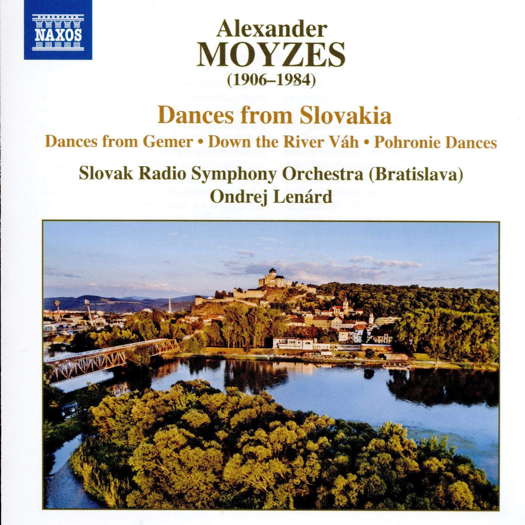 CENTRAL ENGLAND: Mike Wheeler's concert reviews from Nottingham and Derbyshire feature high profile artists on the UK circuit - often quite early on their tours.
CENTRAL ENGLAND: Mike Wheeler's concert reviews from Nottingham and Derbyshire feature high profile artists on the UK circuit - often quite early on their tours.
 DISCUSSION: What is a work? John Dante Prevedini leads a discussion about The performing artist as co-creator, including contributions from Halida Dinova, Yekaterina Lebedeva, Béla Hartmann, David Arditti and Stephen Francis Vasta.
DISCUSSION: What is a work? John Dante Prevedini leads a discussion about The performing artist as co-creator, including contributions from Halida Dinova, Yekaterina Lebedeva, Béla Hartmann, David Arditti and Stephen Francis Vasta.
- Jacopo Foroni
- Josep Soler i Sardà
- Sweelinck
- Carl Dolmetsch
- Sonia Ganassi
- Ludewig Spohr
- Shakespeare: As You Like It
- Opera Factory

Charming and Engaging
GEOFF PEARCE recommends
Alexander Moyzes' Dances from Slovakia
'... colourful and joyful music, beautifully performed ...'
I had not heard of Alexander Moyzes (1906-1984) before, in spite of the fact that he is considered one of the three most important Slovakian composers of his generation. He comes from a musical family, and his father was also an important composer. Looking forward to this CD, I was not disappointed. This is a reissue of a disc that was recorded in 1989. The music is fresh and inviting, and the playing is impressive.
Whilst earlier composers such as Janáček and Dvořák wrote similar sets, the Dances from Gemer, Op 51 (1955) has strong folk elements and includes the cimbalom, so of course I immediately thought of Kodály. I liked this bright and buoyant music very much. These four dances, quite contrasting in nature, are reminiscent of many of the other nationalistic dances which flourished in collections from the latter half of the nineteenth century. Each one is charming. From my own point of view, I found this set may have been more strongly influenced by Janáček's Lachian Dances than anything else, although Moyzes has a style all of his own. I especially like the third dance, 'Hayduks from Kolesne', which has a gentle and graceful melody and a boisterous middle section.
Listen — Alexander Moyzes: Hayduks from Kolesne (Dances from Gemer, Op 51)
(track 3, 2:02-2:55) © 1989 and 2019 Naxos Rights (Europe) Ltd :
The next group is a journey Down the River Váh, Op 26 (1935/1945), in which the composer followed a similar idea to Smetana's in Ma Vlast. The five movements follow the course of the river until it flows into the Danube. Of course the music goes through mixed terrains, and lifestyles of the locals as it goes on its way, and this is captured in the work's wide-ranging moods, from the dramatic opening in the Tatras, where there are two torrents, which eventually merge into one. The sleeve notes provide the composer's literal commentary. The musical language is more twentieth century in nature than the Smetana work, written about sixty years earlier, but it is easily listened to and enjoyed, and the music is evocative of the scenes it is representing.
Listen — Alexander Moyzes: From Liptov to Orava (Down the River Váh, Op 26)
(track 6, 1:34-2:30) © 1989 and 2019 Naxos Rights (Europe) Ltd :
Listen — Alexander Moyzes: Around Strečno (Down the River Váh, Op 26)
(track 7, 0:00-0:50) © 1989 and 2019 Naxos Rights (Europe) Ltd :
Finally, the Pohronie Dances, Op 43 (1950) are as charming and engaging as the rest of the music on this disc. They are beautifully played and the style of each of the four dances is faithfully captured. I love the wring for the wind instruments generally, as most of my oboe teachers have been either Czech, or Czech inspired, and there is a great tradition from this region of the world. Moyzes is quick to show this to its full advantage. I especially love the opening of 'On the Meadow with Flowers' for its lovely oboe writing and playing.
Listen — Alexander Moyzes: On the Meadow with Flowers (Pohronie Dances, Op 43)
(track 11, 0:00-0:54) © 1989 and 2019 Naxos Rights (Europe) Ltd :
These are substantial dances with plenty of contrast within them, as well as between the movements.
Listen — Alexander Moyzes: At Music after work (Pohronie Dances, Op 43)
(track 13, 0:23-1:22) © 1989 and 2019 Naxos Rights (Europe) Ltd :
If you enjoy colourful and joyful music, beautifully performed, and appreciate other suites of nationalist dances - and I mean this in the best possible way - then you'll really enjoy this disc, and I heartily recommend it.
Copyright © 21 December 2019
Geoff Pearce,
Sydney, Australia

CD INFORMATION - ALEXANDER MOYZES: DANCES FROM SLOVAKIA


